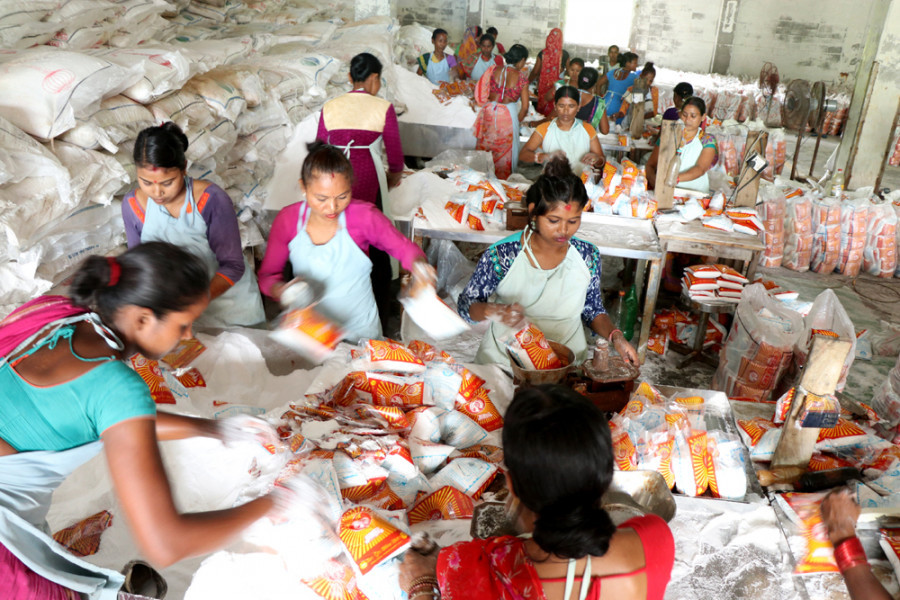Money
Salt Trading Corporation's monopoly comes to an end
Nepalis consume around 200,000 tonnes of iodised salt worth Rs2.5 billion annually, officials say.
Krishana Prasain
The government has ended Salt Trading Corporation's six-decade-old monopoly over the iodised salt trade. Deregulation has removed the stranglehold of the state-run company on the import, transportation, storage and distribution of the essential flavour enhancer.
Salt (sodium chloride) is the most common ingredient added to food while cooking, and has been one of the main trading commodities since ancient times.
Experts say deregulation will stimulate economic activity because it eliminates restrictions for new businesses to enter the market, which increases competition. Since there is greater competition in the market, it will improve innovation and increase market growth as businesses compete with each other, they said.
Salt Trading Corporation has been solely importing iodised salt since 1963 under the Export and Import (Control) Act 1957.
Nepalis consume around 200,000 tonnes of iodised salt worth Rs2.5 billion annually, said Kumar Rajbhandari, deputy general manager of the corporation.
The company has been procuring salt from Gujarat state, India. It sells iodised salt at Rs18.50 per kg to dealers. The retail price is around Rs20 per kg.
“The government's decision to end the monopoly of Salt Trading and open the door to the private sector is a positive step,” said trade economist Posh Raj Pandey. “It is a progressive move to make the business competitive that will benefit consumers.”
Ever since Nepal adopted a liberal economic policy in 1992, the private sector has been lobbying the government to deregulate the salt and petroleum businesses.
Nepal started liberalising its trade and investment regime unilaterally in 1992, and became the first least developed country to join the World Trade Organisation through the full accession process in April 2004.
In 2005, various private companies had filed writ petitions seeking to break the monopoly of Salt Trading on importing and distributing salt. However, the Supreme Court allowed Salt Trading to continue its monopoly.
At that time, the court had deemed it unnecessary to allow the private sector to enter the salt market, ruling that private companies had not developed the necessary infrastructure to supply salt in remote areas.
Eight firms including Himali (Iodised) Salt had moved the court seeking an order to break the monopoly.
Salt Trading used to distribute iodised salt within Nepal with the assistance of different countries.
In a recent interview with Kantipur daily, the Post's sister paper, Deputy Prime Minister and Finance Minister Bishnu Prasad Paudel said that the government took the policy to involve the private sector in the salt business to make the market competitive.
Pandey views that the government should provide equal opportunity to all players. “It should not promote a particular group in any business. There is a public perception that the government may give import licences to certain business people for their benefit,” he said. “That, however, should not happen.”
Experts said that the government’s latest decision sends a message that it is taking the private sector onboard, which may have a positive impact on the national economy in the long term.
Former commerce secretary Purushottam Ojha agrees deregulation will promote a healthy business environment.
“There should, however, be a separate regulating authority to ensure quality, price and supply system as salt is a sensitive and essential commodity,” Ojha told the Post. "There should be a provision to punish traders compromising on quality and engaging in black marketing of salt," he said.
Since Salt Trading Corporation has been distributing iodised salt even in rural parts of the country, the private sector also needs to be capable of having a strong supply network, said Ojha.
“The business should not be limited to Kathmandu Valley or major cities. It has been around two decades since the private sector began lobbying to enter the salt business,” Ojha said.
According to Rajbhandari, there is no profit on the sale of salt in the hills and mountains. The government has been providing a subsidy of Rs170 million annually for the delivery of salt in the hilly and mountainous regions.
The government still has a monopoly on petroleum products and chemical fertilisers, and these sectors too should be opened to the private sector, experts said.




 9.51°C Kathmandu
9.51°C Kathmandu















